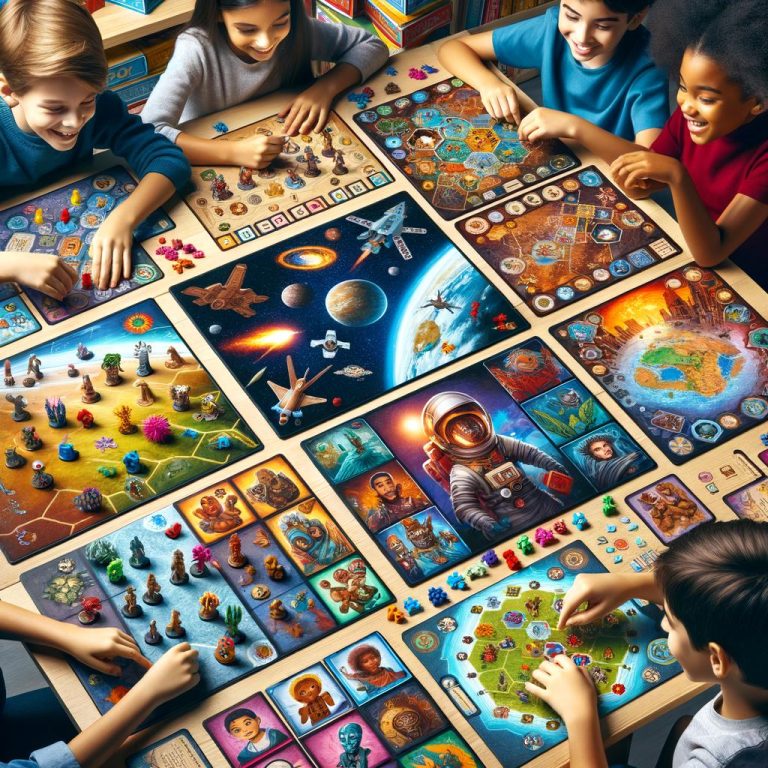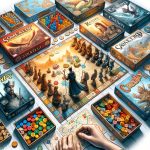Strategy board games for elementary schoolers are more than just a source of entertainment; they are valuable tools for cognitive and social development. These games require players to think critically, strategize, and make decisions – all while having fun. From fostering decision-making skills to enhancing problem-solving abilities, strategy board games offer a myriad of benefits for kids.
In today’s digital age, where screens dominate children’s leisure time, strategy board games provide a welcome break from electronic devices. They encourage face-to-face interaction, promote healthy competition, and stimulate the brain in a way that video games often cannot. By engaging in these analog games, elementary schoolers can sharpen their analytical thinking and develop important skills that will benefit them in various aspects of their lives.
Parents and educators alike understand the value of introducing strategy board games to young learners. Not only do these games offer an enjoyable pastime for children, but they also serve as effective educational tools.
In the following sections, we will explore the benefits of playing strategy board games for kids, highlight the top 5 strategy board games suitable for elementary schoolers, discuss how to choose the right game for your child, provide tips for teaching these games effectively, uncover the educational value behind them, and suggest fun ways to incorporate them into learning activities.
Benefits of Playing Strategy Board Games for Kids
Strategy board games offer a multitude of benefits for elementary schoolers beyond just entertainment. One significant advantage is the enhancement of critical thinking skills. Playing these games requires strategic planning, problem-solving, and decision-making, which can help children develop their analytical skills at a young age. By engaging in gameplay, kids learn how to anticipate consequences of their actions, think ahead, and adapt to changing situations – all valuable abilities that can be advantageous in academics and everyday life.
Another benefit of strategy board games for kids is the development of social skills. Many of these games involve interaction with other players, promoting communication, teamwork, and sportsmanship. Children learn how to take turns, follow rules, negotiate with others, and cope with both winning and losing. These social interactions are essential for building positive relationships and fostering empathy and understanding towards others.
In addition to cognitive and social benefits, playing strategy board games can also improve concentration and focus in children. With the myriad distractions present in today’s technology-driven world, engaging in a mentally stimulating tabletop game can help kids practice sustained attention.
Whether it’s weighing different options in a game of chess or planning their next move in a round of Settlers of Catan, children learn to concentrate on the task at hand without being sidetracked – a skill that can translate into improved academic performance and overall productivity.
| Benefits | Details |
|---|---|
| Critical Thinking Skills | Enhancement through strategic planning and problem-solving |
| Social Skills Development | Promotes communication, teamwork, and sportsmanship |
| Concentration and Focus | Improves ability to stay focused on tasks amid distractions |
Top 5 Strategy Board Games for Elementary Schoolers
When it comes to choosing strategy board games for elementary schoolers, there are plenty of options available that not only provide entertainment but also help develop important skills such as critical thinking, decision-making, and problem-solving. Here are the top 5 strategy board games that are perfect for children in primary school:
- Ticket to Ride: This beloved game challenges players to build train routes across North America while strategically blocking their opponents. It requires planning, spatial reasoning, and resource management skills.
- Catan Junior: Based on the popular Settlers of Catan game, Catan Junior simplifies the gameplay for younger audiences. Kids can learn about trading, negotiation, and strategic placement of their pirate hideouts and ships.
- Robot Turtles: Designed to teach young children the basics of programming concepts, Robot Turtles is a fun way to introduce logic and problem-solving skills through a board game format.
- Outfoxed.: This cooperative deduction game has players working together to solve the mystery of who stole Mrs. Plumpert’s prized pot pie. Children practice deductive reasoning and teamwork while enjoying the engaging storyline.
- Kingdomino: A unique twist on classic dominoes, Kingdomino challenges players to build their own kingdoms by strategically selecting domino tiles with different terrain types. It encourages spatial awareness and forward planning.
Playing these strategy board games not only provides entertainment but also offers numerous benefits for elementary schoolers such as honing their strategic thinking skills and fostering healthy competition in a fun setting. By incorporating these games into your child’s playtime routine, you can help them develop important cognitive abilities that will serve them well both in academics and everyday life.
How to Choose the Right Strategy Board Game for Your Child
When it comes to choosing the right strategy board game for your child, there are a few key factors to consider. One of the most important things to keep in mind is your child’s age and developmental level. Not all strategy board games are suitable for elementary schoolers, so be sure to select games that are age-appropriate and offer the right level of challenge.
Another factor to consider when choosing a strategy board game for your child is their interests and preferences. Some kids may prefer fantasy-themed games, while others may enjoy more abstract or puzzle-based games. By selecting a game that aligns with your child’s interests, you can increase their engagement and enjoyment.
To help you make the best choice, here are some top recommendations for strategy board games for elementary schoolers:
- Settlers of Catan Junior: A simplified version of the popular Settlers of Catan game, perfect for introducing young kids to strategic thinking.
- Sequence for Kids: A fun and colorful game that helps children develop critical thinking skills and pattern recognition.
- Hoot Owl Hoot.: A cooperative game where players work together to help owls fly back to their nest, teaching kids the value of teamwork and planning ahead.
By considering your child’s age, interests, and preferences when selecting a strategy board game, you can ensure that they have a positive playing experience that enhances their cognitive skills and decision-making abilities. Introducing these types of games at an early age can also set a strong foundation for future learning and development.
Tips for Teaching Strategy Board Games to Kids
When it comes to teaching strategy board games to kids, it’s important to approach the task with patience and creativity. Children may need some guidance and practice to understand the rules and strategies involved in these games, but with the right approach, they can quickly pick up on them and even develop their own tactics. Here are some tips for parents and educators looking to teach strategy board games to elementary schoolers:
Start With Simple Games
One of the best ways to introduce elementary schoolers to strategy board games is by starting with simpler ones before moving on to more complex options. Games like Connect 4 or Tic Tac Toe can help children grasp basic concepts such as forming patterns or predicting opponents’ moves. As they become more comfortable with these games, gradually introduce them to more challenging ones like Chess or Catan Jr.
Explain Rules Clearly
Before diving into a game, take the time to explain the rules clearly and concisely to your child. Use simple language and demonstrate examples whenever possible. Encourage questions and offer guidance as they play their first few rounds. Understanding the rules is crucial for kids to enjoy the game and develop strategic thinking skills.
Encourage Critical Thinking
or “What do you think your opponent will do next?” This helps kids analyze situations strategically and improve their overall gameplay skills. By fostering a mindset of strategic thinking in children at a young age through playing these games, they can enhance their cognitive abilities in a fun and engaging way.
The Educational Value of Strategy Board Games for Elementary Schoolers
Strategy board games are more than just a source of entertainment for elementary schoolers – they also provide valuable educational benefits. These games help children develop critical thinking skills, improve decision-making abilities, enhance problem-solving capabilities, and sharpen their strategic planning skills. By engaging in these games, kids learn how to strategize, anticipate consequences, and adapt their plans based on changing circumstances.
Enhancing Cognitive Skills
Playing strategy board games encourages children to think critically and analyze situations before making decisions. Whether it’s deciding which move to make next or predicting their opponent’s actions, kids are constantly exercising their cognitive abilities while playing these games. This process helps them improve their concentration, memory retention, and logical reasoning skills.
Promoting Social and Emotional Development
Strategy board games also offer opportunities for kids to interact with peers, practice good sportsmanship, and learn how to handle success and failure gracefully. These games teach children the importance of teamwork, communication, patience, and perseverance. Through friendly competition and cooperative play, kids can develop empathy, respect for others’ perspectives, and emotional intelligence. Additionally, playing strategy board games can boost children’s self-confidence as they successfully navigate challenges and come up with innovative solutions.
Reinforcing Academic Concepts
Many strategy board games incorporate mathematical concepts such as counting, patterns recognition, geometry, probability, and spatial reasoning. By playing these games regularly, elementary schoolers can reinforce what they have learned in the classroom in a fun and engaging way. For example, games that involve calculating scores or measuring distances help kids apply mathematical skills in a practical context.
Similarly, games that require reading comprehension or following instructions enhance literacy skills among young players. The educational value of strategy board games extends beyond the gaming table and into various aspects of academic learning.
Fun Ways to Incorporate Strategy Board Games Into Learning
When it comes to incorporating strategy board games into learning for elementary schoolers, the possibilities are endless. One fun way to do so is by organizing a board game tournament in the classroom. Students can be divided into teams and compete against each other in games like Chess, Checkers, or even Ticket to Ride. Not only does this encourage teamwork and healthy competition, but it also helps improve critical thinking and strategic planning skills in a playful setting.
Another creative way to incorporate strategy board games into learning is by integrating them into lesson plans. For example, teachers can use games like Blokus to teach concepts of geometry and spatial reasoning. Similarly, Risk can be used to explore topics related to geography and world history. By aligning these games with academic subjects, students not only have fun playing but also reinforce their classroom learning in a hands-on manner.
Furthermore, strategy board games can be used as a reward system for students who complete their assignments or demonstrate good behavior. This serves as motivation for children to stay engaged and focused throughout the day. Additionally, hosting game nights or family game days where parents are involved can further enhance the learning experience for elementary schoolers outside of the classroom environment.
| Strategy Board Game | Recommended Age |
|---|---|
| Chess | 6+ |
| Catan Junior | 7+ |
| Jr. Stratego | 5+ |
Strategy Board Game Recommendations for Different Age Groups
When it comes to choosing strategy board games for elementary schoolers, considering the age appropriateness of the game is crucial. Different age groups have varying levels of cognitive abilities and attention spans, so selecting a game that aligns with your child’s developmental stage is key to ensuring an enjoyable and educational gaming experience.
For younger elementary school children, ages 5-7, simple yet engaging strategy board games can help in building important skills such as critical thinking, problem-solving, and decision-making. Games like “Candy Land” or “Chutes and Ladders” are perfect for this age group as they introduce basic game mechanics while also providing a fun and interactive experience.
As children progress to the 8-10 age group, more complex strategy board games can be introduced to further challenge their cognitive abilities. Games like “Risk Junior” or “Ticket to Ride: First Journey” are great options for this age range as they involve more strategic thinking and planning. These games not only provide entertainment but also help in honing skills like resource management and forward thinking.
For children aged 11 and above, advanced strategy board games such as “Settlers of Catan” or “Pandemic” can offer a deeper level of complexity and strategic depth. These games require players to make long-term plans, adapt to changing circumstances, and work collaboratively with others – all valuable skills that can benefit them both in and out of the classroom.
By selecting the right strategy board games based on your child’s age group, you can provide them with an enriching and enjoyable gaming experience that promotes cognitive development and critical thinking skills.
Conclusion
In conclusion, strategy board games offer numerous benefits for elementary schoolers and play a crucial role in their development. Not only do these games enhance critical thinking skills, problem-solving abilities, and decision-making processes, but they also promote social interaction and communication among children. By engaging in strategy board games, kids learn valuable lessons in patience, perseverance, and sportsmanship – all essential qualities for success in both academics and life.
Furthermore, the educational value of strategy board games cannot be overstated. These games help improve memory retention, concentration levels, and cognitive abilities in young learners. The act of devising tactics and forming strategies to outwit opponents fosters creativity and strategic thinking skills that can be applied to various aspects of a child’s life. Additionally, playing strategy board games provides a fun way for kids to practice math skills, improve reading comprehension, and enhance spatial awareness.
As parents and educators, it is essential to recognize the importance of incorporating strategy board games into children’s learning activities. By introducing these games early on and guiding kids through the rules and strategies involved, we can help them develop a love for problem-solving and critical thinking.
Whether it’s through classroom activities or family game nights at home, strategy board games can create memorable bonding experiences while also nurturing valuable skills that will benefit children throughout their academic journey and beyond.
Frequently Asked Questions
What Is the Most Popular Strategy Board Game?
The most popular strategy board game is undoubtedly chess. With centuries of history and millions of players around the world, chess requires strategic thinking, planning ahead, and understanding your opponent’s moves – making it a timeless classic.
What Is the Strategy Game for 9 Year Old Boy?
For a 9-year-old boy, a great strategy game would be “Ticket to Ride: First Journey.” This simplified version of the classic “Ticket to Ride” board game is easy to learn, yet still offers plenty of strategic depth and fun for young players.
What Are the 5 Most Popular Board Games?
Some of the most popular board games currently include classics like Monopoly, Scrabble, and Risk. Additionally, modern favorites like Settlers of Catan and Pandemic have gained immense popularity in recent years due to their innovative gameplay and strategic elements.

I love playing all kinds of games – from classics like Monopoly to modern favourites like Ticket to Ride.
I created this blog as a way to share my love of board games with others, and provide information on the latest releases and news in the industry.





